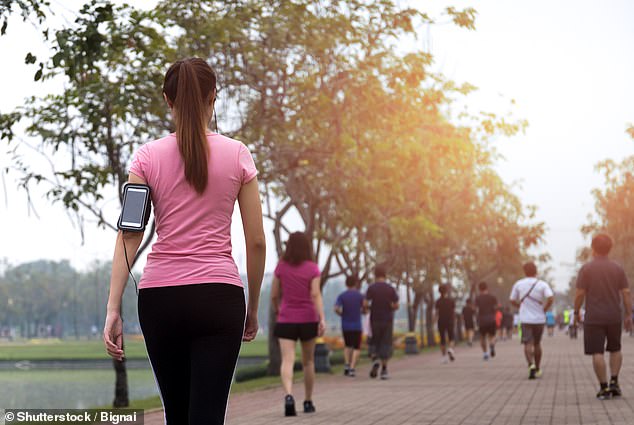[ad_1]
Walking to work saves you money and gets your step count up – but scientists say it also cuts the risk of certain cancers.
Commuting on foot almost halves the risk of liver tumours and slashes the odds of getting kidney cancer by a third.
By contrast, driving every day increases the likelihood of suffering from bladder cancer by almost 40 per cent.
Scientists from Oxford University and the University of Auckland in New Zealand analysed how daily travel affected the risk of getting certain tumours, looking at the commuting habits of more than 250,000 Britons aged 40 to 69.
They found that 14 per cent of volunteers walked to work, 8 per cent cycled, 15 per cent used public transport and 63 per cent drove.
Previous research by the team had shown walking or cycling to work daily cuts the danger of breast and bowel cancer.

Commuting on foot almost halves the risk of liver tumours and slashes the odds of getting kidney cancer by a third, a study has found (stock image)
The latest research, published in the International Journal of Epidemiology, looked at commuting’s links with 16 other cancers. Apart from liver and kidney tumours, the team found that travel habits had no obvious impact on the rest.
They said: ‘Active commuting, such as walking, integrates exercise into daily routines, while driving increases sedentary behaviour.’
The scientifically proven way to stay cool
The mercury is climbing again and Britain is basking in yet another heatwave.
But if you’re wondering how best to stay cool in the sweltering conditions, fear not – scientists have come up with the perfect formula.
The trick is to use an electric fan to cool the body’s exterior, while drinking the right amount of cold water for your weight – to ensure you don’t overheat inside.
Researchers from Heibei Vocational University of Technology and Engineering in Xingtai, China, found that the body cools best when someone sits near a fan and downs 6ml of cold water an hour for every kilogram they weigh.
For someone weighing 90kg – or around 14st – this equates to 540ml of cold water, or just under a pint, every hour. A person weighing 60kg, or just under 10st, would need to drink around 360ml an hour – or two-thirds of a pint.
This researchers found that this method was the best way to lower body temperature, minimise sweat loss and reduce blood pressure and heart rate. Drinking smaller quantities of water while using a fan – or just using a fan on its own – was much less effective, according to results published in the Journal of Thermal Biology.
The Chinese researchers recruited 14 young men and subjected them to eight hours of extreme heat exposure – with temperatures averaging 36.5C (97.7F). At different times they either had no cooling aids at all, just used a fan, or had a fan and access to different quantities of cold water.
Fans helped but without drinking water simultaneously they increased the risk of dehydration, the study found. And too little cold water failed to stem the negative effects of heat on the body.
In a report the researchers said heatwaves will become a bigger threat to health – especially as many homes are not equipped with air conditioning.
Laughter is the best medicine to beat pain of a tummy op
Abdominal surgery may be no laughing matter – but watching just 25 minutes of comedy before going under the knife could reduce the pain felt afterwards, a study has found.
Each year the NHS carries out about 1.3 million such operations in England, including appendix removal and hernia repair, which usually leave patients needing painkillers afterwards.
Laughter is already known to promote the release of endorphins – the body’s natural painkillers – and ease the tension in muscles which can contribute to pain. In a bid to test how far it worked in practice, researchers recruited 176 patients who were due to have abdominal surgery.
Half of the group were asked to watch 25 minutes of clips from a popular TV comedy, while the rest were not given anything to watch.
The results, published in the journal Nursing And Health Sciences, showed that those who had enjoyed a good belly laugh reported reduced levels of anxiety before the operation and lower levels of pain afterwards.
On average, their anxiety and pain levels were found to be almost half of those in the group who did not watch the show. The Turkish scientists concluded that watching comedy could be a useful drug-free way to prepare for surgery.
‘Whether it is minor or major surgery, pre-operative anxiety is seen in many patients,’ they said. ‘But humour and laughter can increase tolerance to pain and have positive effects on mood.’
[ad_2]
This article was originally published by a www.dailymail.co.uk . Read the Original article here. .

